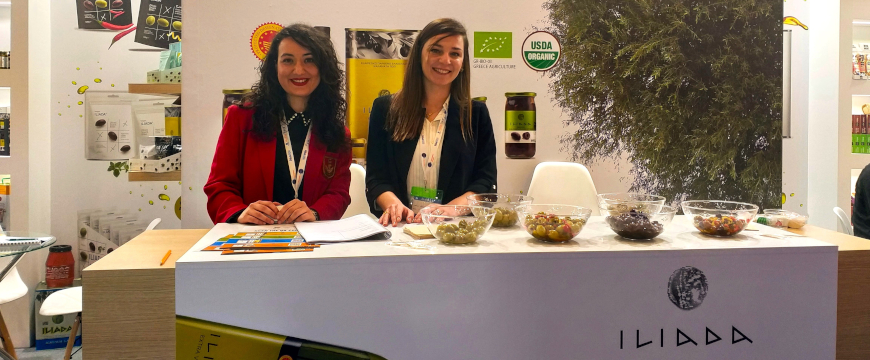At the 2024 Food Expo in Athens, hundreds of Greek olive oil company representatives joined other food and drink professionals to exhibit products and connect with buyers. They also talked with Greek Liquid Gold about the Expo’s usefulness, their companies’ innovations, and the challenging crop year, with high prices and growing evidence of global warming.
At the Metropolitan Expo exhibition center on March 9-11, many professionals working with Greek olive oil expressed concern that the current high olive oil prices could be driving some consumers away from olive oil, and especially extra virgin olive oil (EVOO). For anyone who can afford extra virgin olive oil, those who work with it agree that it is certainly worth the money even now, especially considering its health benefits. There seemed to be general agreement that in the past olive oil producer prices were so inappropriately low (just 2 euros per kilogram at some points) that they barely covered farmers’ costs. However, many also suggest that the current high prices may burden both consumers (who can afford less of this healthy product) and producers (who may struggle to sell high-priced olive oil).
As Antonis Kalligiannis (Zero One) explains, now many “producers are happy with the high price, but olive oil should cost 5 to 7 euros, so it’s affordable for consumers and a good enough price for a new producer to care about his olive groves.” With a more moderate, yet fair, price, he suggested, producers would believe it is worth putting effort into caring for groves, rather than neglecting or abandoning them because they are unprofitable.
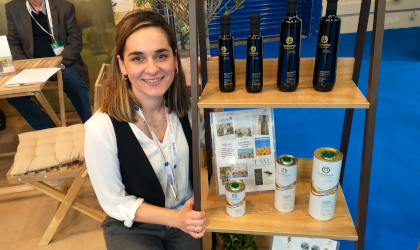
Marianna Devetzoglou (Oleosophia) agrees: “I would prefer to have a lower but fair price. We don’t want to make olive oil a luxury; we want it to be for everybody.” Similarly, Emmanouil Andreadakis (Critida) pointed out that if prices get any higher, “the olive oil will stay on the shelves.” Nikolas Tragakes (Hellenic Agricultural Enterprises) has noticed a “wait and see” approach among some of his company’s clients, who are purchasing reduced quantities for now. He believes “the market will be guided from the bottom up; it’s the consumer” that determines what will happen, based on purchasing decisions. Maria Foule (Cretan Mill) is hopeful that “when prices drop, consumption will go back up, even if the prices don’t go back to” the extreme lows of the past.
This year’s unusually high prices relate to supply and demand: the crop year of 2023-24 was challenging for most Greek producers, who produced a lower quantity of olive oil than usual, and in some cases struggled to achieve the desired quality. Weather-related poor harvests significantly reduced the global olive oil supply. In certain cases, larger companies with many suppliers seemed better able to cope with the challenges than some of the small businesses whose olive oil comes from their own estate or a smaller number of farms, but results varied widely.
For example, Oleosophia’s small business owner reported that she was “happy with the quality, very happy, but I wish we had more quantity.” On the other hand, AGROVIM, one of Greece’s largest olive oil companies, collaborates with 7,000 producers and 100 olive oil mills, which enabled them to bottle their usual 10 to 12,000 metric tons of olive oil this crop year, with “super quality,” according to Eva Antonopoulou.
Given the disappointing harvest in many parts of Greece, several shared their concern about growing evidence of the effect of global warming on olive trees, as we see worse droughts and forest fires, more extreme weather events, and unusually mild winters (which are not beneficial for olive trees, given their need for a certain amount of sustained cold). Coming from Chalkidiki, northern Greece, where the harvest was especially unsatisfactory due to the warm temperatures this crop year, Evi Psounou Prodromou (Yanni’s Olive Grove) commented, “climate change is here, and will be here from now on.”
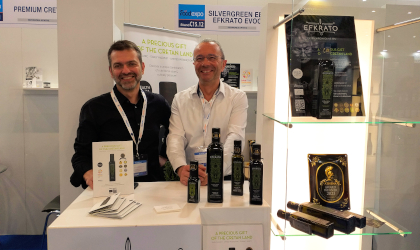
As Devetzoglou added, “we’re seeing that the seasons are off tune; we don’t have real winters. The olive tree is a resilient tree, but it does need time to adapt, and we should help with regenerative practices and some irrigation if possible.” Emmanuel Vantarakis (Efkrato) is also using “biodynamic methods and regenerative agriculture to help trees be capable of coping with challenging increases in temperatures.”
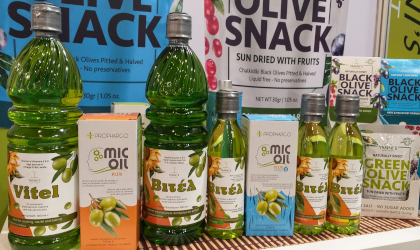
Even in the face of the year’s challenges—in some cases, spurred by them—Greek olive oil companies continue to innovate. For example, at the Food Expo Yanni’s Olive Grove introduced Vitel, a vitamin-enriched plant-based condiment composed mostly of extra virgin olive oil, to be sold in supermarkets. A more affordable version of the extra healthy MICOIL EVOO product introduced at last year’s Expo, which is sold in pharmacies, Vitel offers a new economical option “to feed families with a high quality product, not seed oils, if they cannot afford extra virgin olive oil,” as Prodromou said. Rich in Omega 9 fatty acids, the plain version is suitable for all kinds of cooking, while versions flavored with basil, orange, or lemon for salads and baking are rich in Omega 3 fatty acids.
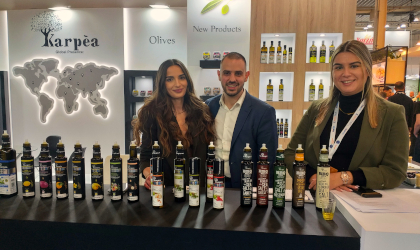
A few aisles away at the Expo, Karpea was presenting a wide range of flavored olive oils in a product line that is “practical, simple, and healthy, in line with our fast-paced reality,” as Evita Pappa explained. Including five unusual smoked barbecue flavored olive oils, these “allow you to add a variety of tastes quickly,” making cooking easier. Karpea’s new bottle tops also provide “effortless pour, spotless flow,” as their logo says, to make cooking more pleasant by keeping it neat and clean.
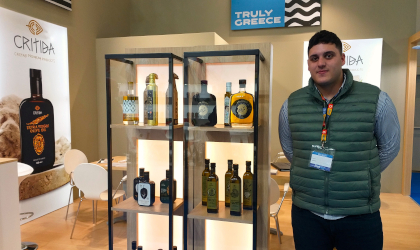
For a fresh approach to attractive packaging, Andreadakis reported that Critida is offering dark glass bottles with gold labels featuring six different label designs for the same store shelf, so consumers can choose their favorites. At the same time, Ladolea is extending their much-admired classic line of hand-made ceramic pots with novel sea salt and oregano products packaged alongside their extra virgin olive oil in attractive boxed sets.
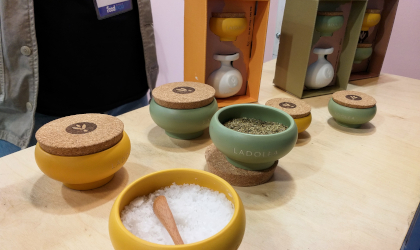
While many olive oil producers are concerned about the situation in the sector this year, there was also optimism at the Expo. Efkrato’s Vantarakis was very happy to have met people interested in their sustainable, healthy products, “and it’s always a pleasure and very useful to meet colleagues with common problems everybody faces; it’s encouraging in a sense.” Similarly, Ioanna Diamanti (Pellas Nature) appreciates the opportunity to both see international buyers and “talk with producers,” which can work like “therapy.” She also finds it inspiring “when you meet other people that are working hard and have a good outcome: you have a target or goal to reach them or surpass them.” This is “the bright side of competition.”
At the Expo, Diamanti saw “many new small producers trying to break into the market. This is good. The important thing is to be here again next year, to persist, not just dream.” And adapt: “I have great hope for this, because I see the young people are adapting, and they accept science, support, teaching.” One adaptable young person with a background in science, Marianna Devetzoglou, also has hope: “now the trees look promising; we’re a bit concerned because of lack of cold weather, but we are hopeful for the next harvest, hopeful that it will be better than this year.”
All businesses, organizations, and competitions involved with Greek olive oil, the Mediterranean diet, and/or agrotourism or food tourism in Greece, as well as others interested in supporting Greeks working in these sectors, are invited to consider the advertising and sponsorship opportunities on the Greek Liquid Gold: Authentic Extra Virgin Olive Oil website. The only wide-ranging English-language site focused on news and information from the Greek olive oil world, it has helped companies reach consumers in more than 220 countries around the globe. Check out the special offers valid for selected ads arranged by April 15, 2024.


